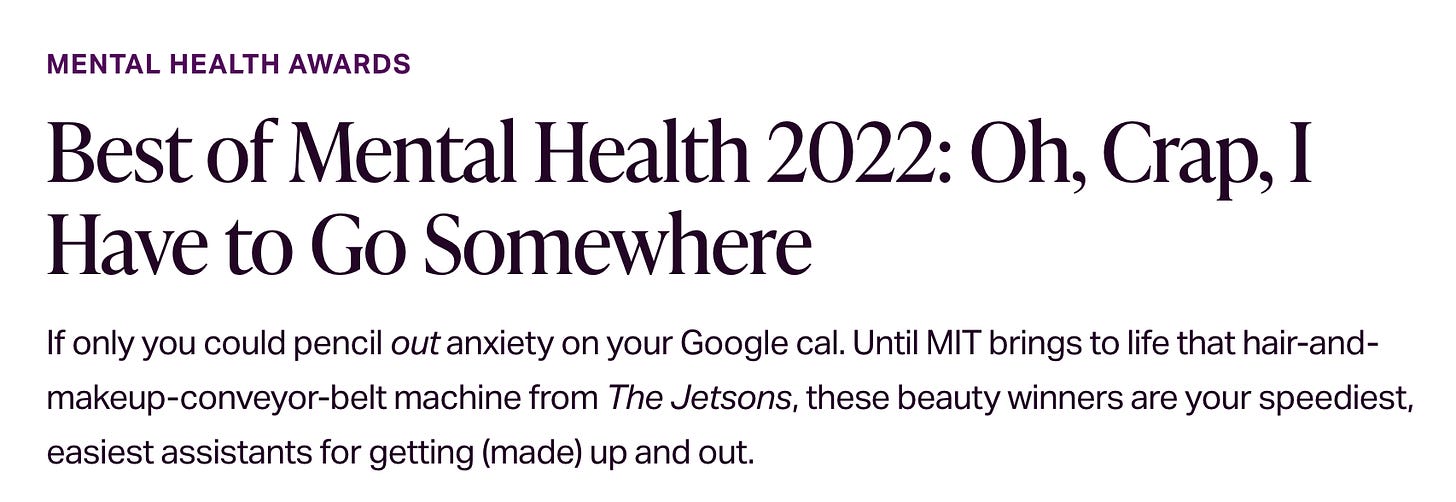Hello, dewy dust bunnies, and welcome to another edition of the The Don’t Buy List! Last week the wonderful folks over at Embedded asked me to pick one “defining” post of 2022, and this TikTok from Julia Fox — the one where she says “aging is in” — came to mind.
 Tiktok failed to load.
Tiktok failed to load.Enable 3rd party cookies or use another browser
As I told Embedded: It perfectly captures the spirit of beauty culture in 2022. The vibe is performative push-back, baby!! Fox says that “aging is in” on TikTok while posting paid ads for wrinkle-reducing Xeomin injections on Instagram; consumers rail against terms like “anti-aging” while getting Botox in record numbers. Maybe in 2023 we’ll realize that words are not an effective weapon against the aesthetics of oppression?
Anyway!
I was interviewed by Body Type’s Mikala Jamison about cosmetic transparency, Dolly Parton’s plastic surgeries, handling appearance compliments, and so much more. I’m thankful she gave me space to share my hottest beauty culture take, which is that we should judge ourselves more!! From the interview:
Today, there is more critique of beauty culture, but I see so much of it come with this caveat of “I’m not judging anybody who does it!” It waters everything down. I think some judgment is fine, self-judgment is good. It’s fine to judge ourselves, and if someone is choosing to do something that is compounding a collective problem, what’s the problem with a little judgment?
Read the full thing (and subscribe to Body Type) here.
Forbes journalist Anna Haines also interviewed me for her excellent piece on “How AI Avatars And Face Filters Are Altering Our Conception Of Beauty.” I talked about how modern “beauty” seeks to “optimize” the human body and turn it into a humanoid machine.
While we might be seeing magical renderings of ourselves for the first time, the desire to control our appearance is nothing new. Since the industrial revolution, DeFino says the body has been increasingly treated like a machine and a site of commodification. Highlighting and contouring, for example, are not techniques that accentuate human features, but are rather used to recreate light design; a natural progression from a western beauty standard that DeFino says originates in the flawless, ethereal glow of woman in Hollywood films that was created by low quality cameras.
DeFino also points to the common use of terms like “optimize” and “efficiency” in the beauty industry, and the rise of treatments like radiofrequency facials, LED light masks and the use of NASA technology in serums, as examples. “We view ourselves as machines that can be tinkered with and made better, rather than accepting our raw humanity,” the beauty reporter tells Forbes.
As the discrepancy between the idealized online image and real self grows, so too, does the potential negative effects on our physical and mental health. “Depression, anxiety, body and facial dysmorphia, disordered eating, self-harm—these are all sky-rocketing right now and a part of that has to do with the disconnect between ourselves and our ideals,” says DeFino.
The article includes a psychologist’s perspective too, so I really recommend reading the whole thing.
Right after that interview, I came across an article on Allure about robotic lash extensions. The author says they make for a “‘natural but not done’ look,” so… yeah.
Have you seen all the back-and-forth about buccal fat removal over the past couple of weeks? I have so much to say about it — stay tuned for an article early next year — but in the meantime, I talked to The Daily Beast about the alarmingly chiseled surgical trend.
“I’ve honestly been surprised that the culture has taken to plastic surgery with such enthusiasm at the same time as we were starting to work through some of the problematic aspects of diet culture,” beauty writer Jessica DeFino told The Daily Beast. “For the past couple of years we have been championing this unattainable ideal of beauty in place of diet culture, which set the stage for diet culture to come back and be recast as active empowerment and body autonomy. Now we’re seeing these things collide in the buccal fat removal procedure, which is ultimately glorifying a fatphobic, capitalist [appearance] ideal.”
A former Allure editor launched the “first-ever Mental Health Awards” this month to showcase products that “help people manage various mental health conditions and symptoms.” Ironically, scrolling through their selections has plunged me into a deep depression! I mean…





